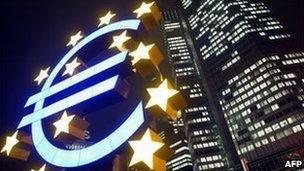The Great British Brexit
- Published

The next European Parliament elections are likely to reveal the strength of the eurosceptic campaign
A boost to national confidence is likely to be one result of the London Olympics. Big enough to influence Britain's place in Europe?
We don't know yet, of course, or how long the reflected glory from the gods of Mount Olympus will reflect on politics and the economy at the other end of Europe.
But as the Olympics head to the close, the possibility of a British exit from the European Union - or a 'Brexit' - is getting a serious airing in London financial circles.
A senior analyst with Nomura, Alastair Newton, chose the day before the 60th anniversary of the creation of the European Union's forerunner - the European Coal and Steel Community - to set out an assessment (and one with a rare lack of bias) of where Britain stands as the European Union stumbles on with its continent-sized crisis.
Or indeed, if it doesn't stand, perhaps Britain walks away.
Tory turmoil
Much of this is an assessment of the state of play within the Westminster coalition, and in particular, David Cameron's relationship with his eurosceptic backbenchers.
For those in Scotland, where there are no Tory backbench MPs, eurosceptic or otherwise, this debate can feel rather distant.
But what Mr Newton underlines is that the Prime Minister's position is being greatly weakened by the rising confidence of dissident backbenchers.
They've shown their muscle in forcing the Government to abandon Lords reform.
But the one issue that really motivates them is Europe.
And even among those Conservatives who care less about the issue, lots of them care about the electoral implications of the UK Independence Party exploiting the coalition's weakness.
A date to put in the diary is the next nation-wide test of political opinion, in June 2014, when UKIP will hope to increase the strong showing it got at the last European Parliament elections.
For those whose focus is on the Scottish independence referendum expected only four months later, the Strasbourg result could be rather significant in determining the capacity of the UK Government to fight a campaign for the UK union.
Much of its focus could be on the campaigns to stay in or out of another political union, across the English Channel.
Defining moment
"The immediate question:" says Mr Newton. "Can the Cameron Government rein in the eurosceptic rebels or are we now heading inexorably towards a defining moment in the UK's relationship with the EU?"
He offers a dispassionate analysis of the UK Government's negotiating strength in shaping Brussels future, noting that events within the eurozone will dictate the pace more than Britain can: very slow for now, but possibly very much faster before long.
And he suggests there is "a non-negligible probability" (you have to love analyst-speak) that yet more euro-crisis will encourage Tory eurosceptics to exert yet more pressure on David Cameron.
This analysis points to the tensions within Britain's position, of wanting the eurozone to enter much deeper integration, while wishing to have nothing to do with it.
The result will probably include the UK being out of the room where the single market is developed further.
It's summed up in a brutal quote from Philip Whyte of the Centre for European Reform: "Three views of the UK are now common across Europe: that it is unreliable and unconstructive; that it is an active distraction from solving the region's worst crisis since World War Two; and that it appears to be heading for the EU's exit door".
Euro-benefits and Brexit costs
In the last few months, we've moved rapidly to the possibility of a referendum after the next Westminster election, not necessarily because the Tories demand it, but because their opponents could do so first, forcing the Conservative leadership to respond.
But it need not mean a complete break from the EU.
Newton suggests a shift along a spectrum of engagement with the EU, which could put the UK much closer to the position of Iceland, Liechtenstein and Norway, within the European Economic Area.
This is of course largely about politics, and above all the internal politics of the Conservative Party.
But the Japanese investment bank hasn't put one of its top analysts on the case out of curiosity about the operations of the Tory Whips' office.
It's looking to inform its investors and its clients about the economic implications of all this. And it's honest in concluding that the consequences are far from clear.
Even assessing the UK's existing position, it's not easy to tell how the benefits of membership compare with the costs.
It's even less easy to compare future benefits with the costs of exiting the EU and having a looser free trade pact - or the longer term benefits that could, arguably, flow from that.
But the plausible possibility, even before a Brexit, is that the UK could find itself in too weak a negotiating position to veto further transfers of power from London to Brussels, including financial market regulation, a banking union and a transactions tax.
Nothing could be more likely to fire up the campaign for a Brexit.
And given the way Britain is being seen across the rest of Europe as it grapples to sustain its own currency project and the strains show through, the response to those Olympian Brits may well be a multi-lingual 'good riddance'.